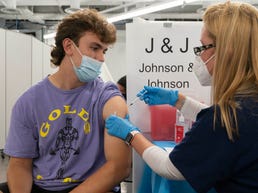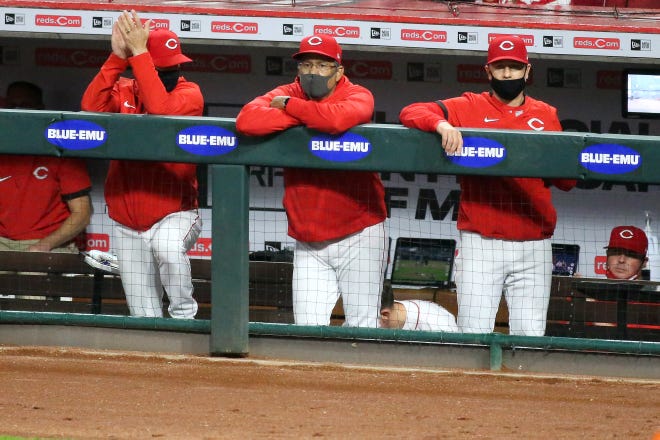
More Americans would be eligible for booster doses of COVID-19 vaccines and could get any brand of vaccine they choose, according to an authorization Wednesday from the Food and Drug Administration.
"We wanted to provide a lot of flexibility," said Dr. Janet Woodcock, acting FDA commissioner.
While many people will want to stick with the same vaccine they already received, others may not remember what they got or will want to switch brands because they had some sort of reaction or side effect that they hope to avoid, she said.
The Centers for Disease Control and Prevention still needs to sign off before booster shots of the Moderna and Johnson & Johnson vaccines become available. A vaccine advisory panel, meeting Thursday, will consider the same expansion of boosters, which would then need approval from the CDC's director.
People who got the Pfizer-BioNTech vaccine can already get a booster shot if they meet certain criteria.
The Moderna booster dose would be half the original dose, at 50 micrograms, while doses of the other vaccines would remain unchanged.
Plenty of booster doses will be available for people who want them, the White House has said.
Under the FDA’s recommendation, people who got Moderna shots originally, like those who got Pfizer-BioNTech, would become eligible for boosters six months after they finish the initial two-dose series if they are over 65 or at high risk for COVID-19 because of health problems, jobs or living conditions.
Dr. Peter Marks, who heads up the FDA division in charge of approving vaccines, said in call with reporters late Wednesday that pharmacies will not require a doctor's note or any other formal proof that someone meets one of these categories. "They're taking people at their word that they fall into one of the categories," Marks said.
With J&J, a second dose of the vaccine will bring protection up to the level provided by the other two vaccines. Everyone who got the J&J vaccine can get a second dose two months after their initial dose with no restrictions.
Demand for mixing vaccines is high.
"Lots of people have been wanting to do this," said Dr. William Schaffner, an infectious disease specialist at Vanderbilt University Medical Center in Nashville, Tennessee.
Allowing mixing ofthe Moderna, Pfizer-BioNTech and Johnson & Johnson COVID-19 vaccines will accelerate efforts to provide booster shots and will combat public confusion, he said.
Data on the safety and effectiveness of mixing vaccines remains extremely limited. The National Institutes of Health presented a study last week that included just 50 people in each category: Moderna after two doses of Pfizer-BioNTech, J&J after Moderna, etc.
Dr. Paul Offit, a vaccine specialist at Children's Hospital of Philadelphia who sits on an FDA vaccine advisory committee, said he wishes there were more data to support mixing and matching. But there's never as much data as decision-makers would like, and in the middle of a pandemic it makes sense to take a few risks in hopes of saving lives, he said.
"The data we have been presented (throughout the pandemic), even though it's a little less than we would be presented normally, has held up," Offit said in an interview. "These vaccines have been much better than we had hoped."
Dr. Cody Meissner, another member of the FDA vaccine advisory committee, said that though data is limited, the agency had to make a decision to address the ongoing national emergency. About 1,000 Americans are still dying every day from COVID-19, he noted.
It's reasonable for people to "mix and match," particularly if they received J&J for their first shot, said Meissner, also a pediatric infectious disease expert at Tufts University School of Medicine in Boston.
The NIH study, which is still preliminary, suggests that getting a different vaccine after a single dose of J&J or two doses of the others triggers the immune system to produce more antibodies. The study has not been going on long enough to know the durability of that protection or how the combinations will work in the real world.
Marks, of the FDA, said the agency didn't want to recommend one particular regimen as the "best" because the data isn't conclusive. "It is indeed possible that something that does not give you as high a level of the antibodies up front may protect you for a longer period of time or more robustly later on," he said.
The boost seemed particularly beneficial for people who got J&J and then one of the other two. Recent data suggests that J&J, initially provided as a "one and done" vaccine, becomes significantly more effective with a second dose.
Still, Meissner said, more good will come from getting additional people vaccinated than from providing extra doses to those already fully vaccinated.
"Boosters are not going to get the pandemic under control," he said. "It's going to be vaccinating everybody who's eligible."
The CDChas long said that it is preferable to stick to the same vaccine for the initial two doses of Pfizer-BioNTech or Moderna but that people could mix if necessary. The two vaccines are very similar, both relying on mRNA technology.
Both vaccines require two doses to reach full effectiveness, though their protection against mild disease appears to wane after about six months among people with weakened immune systems, such as those over 65 or with medical conditions like diabetes or lung disease.
The CDC has endorsed booster shots of Pfizer-BioNTech for people in high-risk categories or whose jobs put them at risk for catching COVID-19 who received that vaccine for their earlier doses. The same approval is likely to come later this week from the CDC committee and then the director for those who received the Moderna vaccine.
The COVID-19 vaccine made by Johnson & Johnson uses a different technology and is presumed safe to get as a first or follow-on shot to the other two. A similar vaccine made by AstraZeneca has been tested in larger studies in Europe in combination with Moderna and Pfizer-BioNTech and was found to be safe.
A decision to allow boosting with any available COVID-19 vaccine will simplify implementation of the process and make it easier to get them to people, said Dr. Kelly Moore, CEO of Immunize.org, which educates health care professionals about U.S. vaccine recommendations.
"Remember, only about 15 million people got J&J. It’s less widely available than mRNA vaccines," she said, "so a decision to restrict boosters to the same product would have created access challenges."
Health and patient safety coverage at USA TODAY is made possible in part by a grant from the Masimo Foundation for Ethics, Innovation and Competition in Healthcare. The Masimo Foundation does not provide editorial input.
Source link








